R.B. Wood's Blog, page 29
July 22, 2012
Hello internet. It’s me!
 "Hello internet. It's me!"
"Hello internet. It's me!"
Now imagine me shouting that in Grand Central Station at rush hour one week before Christmas. Now imagine that every other person around me is also shouting hello. Some of them have bullhorns, some have flashing lights, many of them have their friends pointing to them and drawing attention to them.
That’s what social media feels like to me, a shouting cacophony.
I was one of those kids who liked to be the big fish in a little pond, purposefully never straying out of my comfort zone and keeping to things I was really good at, like writing, art and music. Then the internet exploded and I found out that the little pond was in fact an ocean the size of a planet and there are not only bigger fish. There are sharks.
It’s a little daunting, and it’s impossible to even attempt a website or a blog or a social media engine without a bit of ego on your side. After all, I wouldn’t be doing it, unless some part of me said, “Out of the millions of websites on the internet, you should look at mine. I’m worth reading.”
And this goes against everything about humility and fair play that I was ever taught as a kid. That little kid, who preferred to have everyone tell her. “Oooh! You’re so clever! I could never do that!”
It’s time to grow up, little kid and brace yourself. There’s a lot of sharks out there… sharks with megaphones.
Did I ever mention that metaphors aren’t my strong point?
[image error]
Monica Marier is a caffeinated writer, artist, mother and eccentric. On weekdays, she's busy working on her books, recording audio files, and composing short stories for her blog. On weekends she's a co-founder of Tangent Artists.
Links:
Comics: www.tangentartists.com
Follow her on Twitter! @lil_monmon
Books: Available through Hunt Press http://www.huntpress.com/
Our World out of Context
 It’s a commonality to assume that fantasy and science fiction writers write in the genre they do because they wish to escape the current state of the world. As an avid fantasy and science fiction reader, I can attest to that notion. They are genres that take readers to far places to explore odd creatures, new cultures, and fresh ideas. Yet, because I am also a fantasy writer, I realize that many of the themes in fantasy and science fiction have a hidden context to the real world, be it religion, politics, historical commonalities, etc. This happens in my novels whether I intend it or not. Of course, the worlds I create must have some coherence to the real world in order to maintain their believability to readers, but looking back on my past novels, I also see that burried within my worlds is a reflection of current events and personal questions.
It’s a commonality to assume that fantasy and science fiction writers write in the genre they do because they wish to escape the current state of the world. As an avid fantasy and science fiction reader, I can attest to that notion. They are genres that take readers to far places to explore odd creatures, new cultures, and fresh ideas. Yet, because I am also a fantasy writer, I realize that many of the themes in fantasy and science fiction have a hidden context to the real world, be it religion, politics, historical commonalities, etc. This happens in my novels whether I intend it or not. Of course, the worlds I create must have some coherence to the real world in order to maintain their believability to readers, but looking back on my past novels, I also see that burried within my worlds is a reflection of current events and personal questions.
The truth of the matter is, although I write to escape into a different land with different people, I can’t help but address the here and now. Writing and reading is an outlet for me (as I’m sure for many others) to process events and reflect on personal issues and questions in a safe and somewhat removed way. Oftentimes, these musings are not evident to me while I’m writing—the realization comes later.
Essentially what I find many fantasy and science fiction writers doing is not pulling readers into newly formed and unfamiliar places, but showing readers our own world (or aspects of our own world), taken out of context. Current events, social and historical contexts, politics, and religion are inescapable. The beauty of fantasy and science fiction is their ability as genres to show us our current world through a skewed perspective. And what better way to reflect on our own reality than to take it out of context?
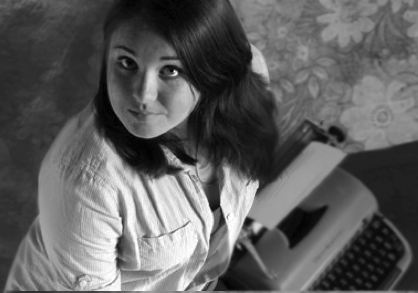
Nicole Persun is a 17 year old student who signed her first book contract at 16. Her novel, A Kingdom's Possession, was recently named a finalist for the ForeWord Magazine Book of the Year Award at the American Library Association conference. In addition to writing, she loves to garden, cook, listen to music on high volume, practice photography, and spend time with her horse Goldie. Read more at NicoleJPersun.com and http://amzn.to/LSlF7s.
July 19, 2012
Finding Time to Write
 If you are a high school student and reading this right now, you are on summer vacation. So what to do with the oodles of time in your day? Well write, of course!
If you are a high school student and reading this right now, you are on summer vacation. So what to do with the oodles of time in your day? Well write, of course!But I know it’s not quite that easy. There are summer camps, family vacations, and friends to hang out with. However, you do have some small gaps between these, and these gaps can be when your best ideas come to you. Jot ideas down in your phone or carry around a pen and paper.
Now we’ve got an idea for a story. Next comes the hard part – expanding upon it. An idea can sound great, but without a full plot, it won’t go anywhere. You need to think of secondary characters, backstory, and the range of emotions you want your readers to feel. Most of all, make this a book you would want to read. If you would read it, then others would want to read it.
So now you have a full plot arc. Now it’s time to write! Sit down at your computer and find some music fitting the mood of the scene you’re writing. When you have your music, let the words flow out of you.
The most important part of the writing process is not to let your outline rule you. If you want to end a chapter differently, then do it. Just don’t make any huge changes without first consulting your outline to make sure it fits. It is absolutely key to not lose sight of where your story is going.
Oh, did I mention have fun? Well have fun! You’re writing a story, and this is your story. Have a good time with it!

Zack Umstead is an honors high school student entering a busy sophomore year, but has still somehow found time to write and publish two stories. Shifter, the first in a young adult scifi novelette series, was published in June of 2011, and Entanglement, a quantum physics young adult novella, in April 2012. What little free time he has left, he's spent earning his senior black belt in Kenpo Karate. Work is currently underway for the next in the Shifter series.
Writing Today
 Today’s world demands a writer not only write, but also market their work on websites, blogs, Twitter, Facebook, interviews, book signings and other marketing opportunities...and also meet the responsibilities of life. One can lose sight of the key to success as a writer, which is to...write! A successful writer simply must write every day. There is no alternative to this rule. You can’t let the lack of time, rejections, harsh criticism and the evil writer’s block deter you from writing.
Today’s world demands a writer not only write, but also market their work on websites, blogs, Twitter, Facebook, interviews, book signings and other marketing opportunities...and also meet the responsibilities of life. One can lose sight of the key to success as a writer, which is to...write! A successful writer simply must write every day. There is no alternative to this rule. You can’t let the lack of time, rejections, harsh criticism and the evil writer’s block deter you from writing.
Writing is a job. Schedule your writing time and let those who love you know what that time is. Be firm on your schedule and don’t let it be altered unless absolutely necessary. This is sometimes hard to do, but essential.
Rejection and criticism are a part of being a writer. Not everyone is going to like your work. Instead of getting angry or emotionally upset about criticism, learn from it. If you see a common thread in the rejections or criticism, you have a problem and you need to fix it.
There is a way around writer’s block. Instead of giving up and walking away from the computer, start working on another story. We all have other stories milling around in our demented minds. While you’re working on the other story, your subconscious mind will be sorting out the writer’s block. This is a scientific fact.
When I believe the whole world is conspiring to prevent me from writing, I look in the mirror. The culprit is usually there.
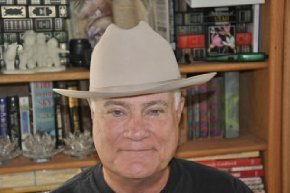
Mike McNeff is a cop who writes about cops. During his 40 years in law enforcement Mike has worked patrol, criminal intelligence, narcotics, and he has been a SWAT team leader and commander as well as a hostage negotiator. He is also an experienced trial attorney in both criminal and civil cases. Writing is Mike's third career and GOTU - A Robin Marlette Novel is his first published book. Find Mike's writing here: http://amzn.to/IJT9yI // GOTUSeries.com , Twitter: @Mike_Mcneff, and Facebook: http://www.facebook.com/MikeMcNeff.Site.
I am a Writer!
 I am a writer!
I am a writer!
This might seem self-evident to anyone who’s read my bio, but I make this point for a reason – when do you start calling yourself “a writer”, as opposed to someone who dabbles in words around a day job?
I took the plunge when my first book was published in October 2011 – it seemed silly to call myself a dabbler in words when I was a published author. It still makes me smile every time I say it.
The main response I get? You must be rolling in it!” or “How big are your royalty cheques?”
I don’t imagine many nurses or teachers getting asked those questions. There seems to be something about authors that people think we’re as financially secure as Stephen King or Neil Gaiman.
I wish.
When I explain that, even now, I hold down another job in addition to the writing, as my first love doesn’t pay enough to live on. Having had the good fortune to make friends with a number of indie authors from across the globe, I know this is a common trait – but non-writers I tell this to look at me askance, as if I had grown a second head.
I can understand that that kind of attitude can put people off saying those magic words, but it shouldn’t – be proud of the fact that you are creative enough to put pen to paper, or finger to laptop.
Come on, now, say it with me; “I am a writer!”
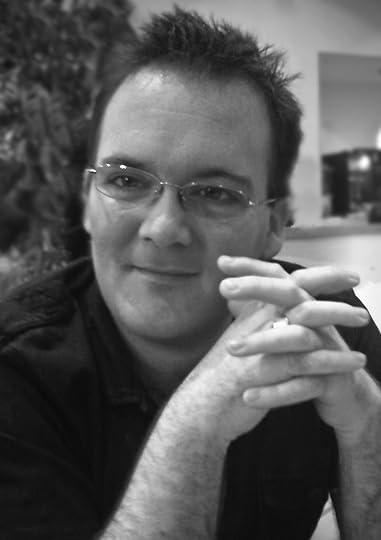 Matthew Munson is an Englishman; born in a small seaside town, he finally moved away when he was 24 ... to another seaside town, four miles away, and is still there now.
Matthew Munson is an Englishman; born in a small seaside town, he finally moved away when he was 24 ... to another seaside town, four miles away, and is still there now.
He wrote his first book at the age of 9, about a space-cowboy who was fleeing from the dinosaurs, and often worried if he had peaked too soon – until his first book was published in 2011.
Fall From Grace is his debut novel, published by a British publishing company called Inspired Quill, and he’s currently working on a sequel – albeit interspersed with the odd short story, column and blog.
Matthew is a proponent of autism studies and Deaf Awareness, which he writes about over at his blog (http://vikingbay.blogspot.co.uk/) and occasionally, if he is feeling particularly daring, makes the odd vlog here and there. He finds writing a solitary exercise sometimes, so go and say hi at his Facebook page – www.facebook.com/matthewmunsonauthor
July 16, 2012
Writing in the 21st Century
 There are volumes to be written on the difference between reading ebooks and paperbacks. Fortunately, the eventual form the book will take doesn't yet affect the actual writing of it but it no doubt soon will. The writing is still that magical process of getting sucked into your imaginings and spending time outside the everyday world. But once you release the finished article, other processes take over - often as incomprehensible as the creative phase.
There are volumes to be written on the difference between reading ebooks and paperbacks. Fortunately, the eventual form the book will take doesn't yet affect the actual writing of it but it no doubt soon will. The writing is still that magical process of getting sucked into your imaginings and spending time outside the everyday world. But once you release the finished article, other processes take over - often as incomprehensible as the creative phase.
For instance, the whole world of selling and publishing baffles me. A book of mine won an award and you can buy it for $10.99 on Amazon USA. Surprisingly, you can also buy 12 new copies of the same book for from $9.15 to $39.17 on the same site. I've no idea what 'added value' (to use that grotesque marketing-speak term), you get for the extra money, but it must be significant.
Even more so for another of my books which will set you back £8.88 for a new copy on Amazon UK but £39.92 for a used copy. And, best of all, there's another award winner of mine (forgive the immodesty) whose present cover price for a new paperback is $12.99 but, again on the same site, used copies are available at prices ranging from $98.53 (yes, almost the magic $100) to (and I swear this is true because I checked it again and again) $250.80.
The world of books is absurd and obviously far too complicated to be understood by mere writers.
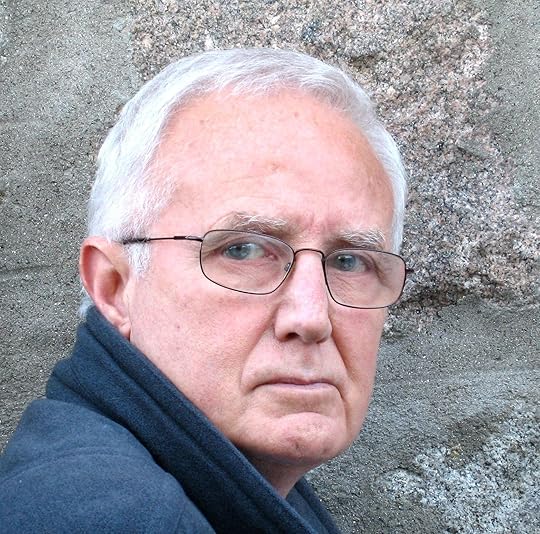
Before taking early retirement to become a full-time writer, Bill Kirton was a lecturer in French at the University of Aberdeen. He’s written stage and radio plays, short stories, novels, skits and songs for revues, and five non-fiction books aimed at helping students with their writing and study skills. His five modern crime novels, Material Evidence, Rough Justice, The Darkness, Shadow Selves and Unsafe Acts are set in north east Scotland and his historical crime/romance novel, The Figurehead, is set in Aberdeen in 1840. The Darkness won the silver award in the mystery category of the 2011 Forward National Literature Awards and his spoof mystery, The Sparrow Conundrum, was the winner in the humor category.
He’s had radio plays broadcast by the BBC and the Australian BC. His short stories have appeared in many anthologies, including three of the CWA’s annual collections, and one was chosen by Maxim Jakubowski for his 2010 anthology of Best British Crime Stories.
Writing as Jack Rosse, he’s published a novel for children called The Loch Ewe Mystery and, with another Jack alias, Jack Lefebre, he’s written a satire based on experiences in Second Life™ called Alternative Dimension.
He’s been a Royal Literary Fund Writing Fellow at universities in Aberdeen, Dundee and St Andrews.
The Casual Writer
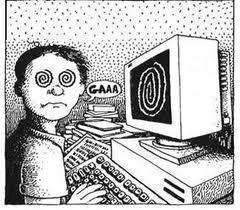 I am a casual writer. …Meaning, writing is not how I make my living and I do not follow any schedule for writing and publishing. I do not have a goal of one published work per month and NaNoWriMo may as well take place on another planet for me. I admire people who tackle it, but I would never get into it myself. I publish about one original short story every two-three months, and I think it’s been over a year since I did a full-size book.
I am a casual writer. …Meaning, writing is not how I make my living and I do not follow any schedule for writing and publishing. I do not have a goal of one published work per month and NaNoWriMo may as well take place on another planet for me. I admire people who tackle it, but I would never get into it myself. I publish about one original short story every two-three months, and I think it’s been over a year since I did a full-size book.
The only thing I write on a regular basis is a food page for a friend’s monthly web-zine. …Just a little something with recipes, step-by-step instructions and photos for people who are reticent about cooking.
I hold a full-time job with a large corporation (yes, one of the evil ones that everyone knows about). I work from home, but my work week still amounts to 60 hours. The nature of my job is such that I have to utilize my brain non-stop – that’s analytics for you.
I am a rampant multi-tasker, but original writing is an exception. I usually don’t have anything else going on when I write. Fortunately, once I get an idea for a story, the rest of it forms in my head and I can carry it around until I have time to write it down. I am verbose, in the best tradition of my Russian ancestors, so one story usually equals one Saturday’s or Sunday’s worth of writing time.
In addition to my own casual writing, I also translate books. Casually. I specialize in less-known works of Russian literature. Somehow, having to think in two languages at the same time does not preclude me from facilitating a conference call or pulling together a forecast report. Perhaps, it is because I am not making anything up – I am just interpreting what someone else has already made up.
The same goes for graphic design. I do all of my own book covers as well as design them for other writers. I can have code running on one computer, while I am selecting images for a cover on the other one, or I can be on a call using speaker phone, with my hands free to crop, resize, recolor, overlay, and export.
Somehow somewhere all that casual writing, translation and cover design spilled into illustration work – both for my own books and translations, and for those by other authors. It is not uncommon for me to pop in a movie – something I like but have watched many times and don’t have to follow – and sketch at the coffee table in my living room while having dinner. … Glass of wine in one hand, pencil in the other, and off we go into the drawing land. One two-hour movie usually yields an illustration and a half.
Interestingly, even casual writing requires full-time levels of promotion. Hootsuite is my best friend and I use it to plug relentlessly to three Facebook pages, twitter and LinkedIn. I keep a spreadsheet with a pivot table that summarizes, what I promote, when, and through which channel. I spend 2-3 hours every week scheduling Hootsuite posts, sneaking them in between loads of laundry, walking the dogs, conference calls, making dinners and vacuuming. I do my best to vary the tag lines, promo frequency and grouping to make sure that people don’t get bored or just plain annoyed. Very surreptitiously (and casually, of course), I post on average 120 – 150 promo links a month, not counting specials (like freebies, discounts and new publications).
To keep my support base strong, I don’t just promote my own work, but also that of other writers I collaborate with. Let’s face it, an indie writer’s closest pal is still another indie writer. I tweet a review of someone’s book, followed by a link to one of my own – they tweet out both to their followers. Everyone is happy. I do a book review combined with the author’s interview on my blog – they return the favor by doing the same for me. And then we can both use these blog posts later by posting them during subsequent months as part of our own promotion.
There are little things, of course, like tagging, liking, rating and reviewing books on Amazon and Barnes & Noble. In addition to written reviews, I also do an occasional video review and post it on YouTube. People like those – they lend a bit more of a personal air to the review process. Of course, I don’t just record and post the videos. Each one gets edited and supplemented with cover images and a soundtrack. A five-minute video review takes up to two-three hours of work before it looks good enough to share with the world.
All writing needs editing – be it my own stuff or the translated stuff. Editing is hard work. I value it highly and, whenever possible, compensate people who edit my work in some shape or form. English being my second language, I outsource my editing to the native speakers. Most of my short stories are edited by my husband, which is fair, considering I help him run his business and do all the promotion work for another business that he and I run together. I also review his books and articles, when he needs a sanity check. For my longer works, I work with my fellow writers. We either settle on a price with a reasonable payment plan, or we barter. For example, a friend of mine currently has one of my translations in for editing, and I have volunteered to help her out with beta reading.
At the end of the day, even with infrequent and irregular publications of my own, there is always something going on that is a) related to writing and publishing, and b) requires time and effort. Perhaps casual writing is not all that casual after all.
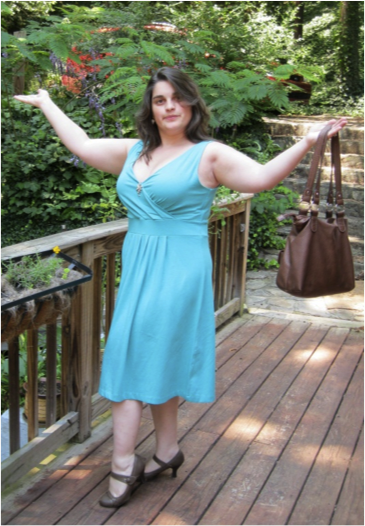
Maria K. is the pen name of Maria Igorevna Kuroshchepova – a writer, translator, and blogger of Russian-Ukrainian decent. Maria came to the United States in 1994 as an impressionable 19-year old exchange student. She received her Bachelors and Masters degrees in engineering from Rochester Institute of Technology (Rochester, NY).
Maria covers a wide range of topics from travel and fashion to politics and social issues. Her science fiction and fantasy works include Limited Time for Tomato Soup, The SHIELD, The Elemental Tales and others.
A non-fiction and science fiction writer in her own right, Maria is also a prolific translator of less-known works of Russian and Soviet literature into English. Her most prominent translations include her grandfather Vasily Kuznetsov’s Siege of Leningrad journals titled The Ring of Nine, and Thais of Athens – a historic novel by Ivan Yefremov. Both works quickly made their way into the top 100 Kindle publications in their respective categories and continue attracting consistent interest and acclaim from readers.
Write a Better Book
I read an interview recently where a writer mentioned how much emphasis is placed on marketing these days, as though marketing will sell your books. She went on to say that better writing was more important. There are a lot of people who are linking and tweeting and tagging their brains out, but haven’t written anything worth publishing. That doesn’t mean they’re not published, of course. It just means that what is published is unreadable, even if you know very little about writing.
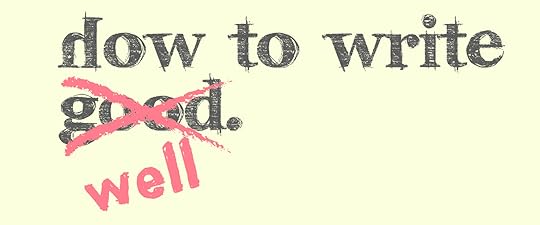
Here’s the insane part: most people don’t know anything about writing well. They just know whether or not they liked the story. Maybe that’s all it’s about. Maybe writing isn’t about art, it isn’t about writing well. It’s about getting the blood pumping inside a teenaged girl’s heart, or teenaged boy’s adrenaline flowing, or some old pervert’s sex drive humming along.
I hear so many people (and read them online) complaining about writing versus marketing, vampire stories versus literary stories, Kindle versus print, large press versus small press. I want to scream, “Who the fuck cares?” I know we all want to make a living. I know we all think our shit (or writing) doesn’t stink. We think we have the next Twilight or Harry Potter or that we’re the next King, or Grisham, or that somehow God is shining His flashlight on us and that we should be next, next!
Well, get in line. Here’s the truth: marketing helps, but if you’ve written a book that no one wants to read, it isn’t going to sell. In case you haven’t been paying attention, anything goes…or doesn’t go, all dependent upon the moon’s phases, the stars lining up, your marketing genius, the number of hours you spend on twitter tweeting your fucking brains out, etc. I’m just saying, if you want readers to spread the word about your book, then you might want to consider writing a better book.
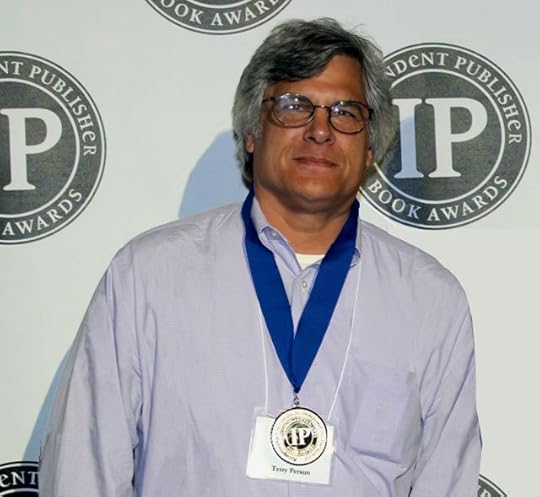
Terry Persun writes in many genres, including historical fiction, mainstream, literary, and science fiction/fantasy. His latest novel, Cathedral of Dreams is a ForeWord Magazine Book of the Year finalist in the Science Fiction category. His novel Sweet Song just won a Silver IPPY Award, too. Terry’s website is: www.TerryPersun.com or you can find him on Amazon at: http://amzn.to/gpWf3L
Return of the Blog Hop
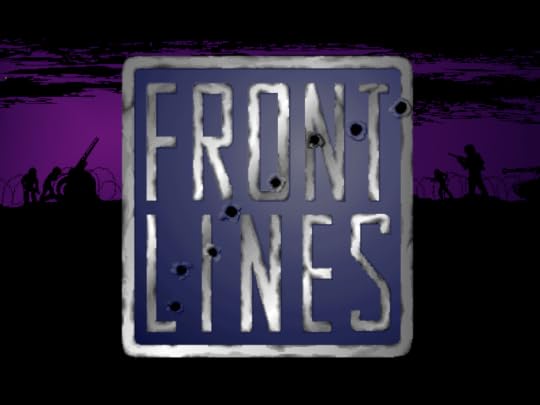 Well, ReaderCON 23 is over and it’s back to normalcy.
Well, ReaderCON 23 is over and it’s back to normalcy.
(Check out my notes from the con HERE but start at the bottom of the post and read up.)
That means it’s time to get back to this years blog hop “From the Front Lines: Writers of the 21st Century”
Tomorrow we’ll be getting back into the groove with a post from Heikki Hietala entitled “Short Story is the New Black.”
In the mean time, you can catch up on the posts so far and, of course, the full schedule is posted off to the left.
PAST POSTS
AUTHOR LINK
Diane Nelson Writing THE END is only the Beginning
D. Savannah George …Who started writing in the 20th
Mercedes Yardley Writing with Ferocity
Monica Marier Thunderbolts and Laser Pens
Tim Queeney Author Website Strategy
Eden Baylee Write What You Know
July 13, 2012
ReaderCON 23

05:30 AM Friday, 13 July
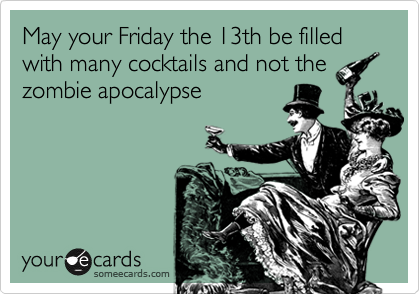 I just realized it’s “Friday the Thirteenth.” What better place for riding out a superstitious day then at a SciFi/Fantasy Convention?
I just realized it’s “Friday the Thirteenth.” What better place for riding out a superstitious day then at a SciFi/Fantasy Convention?
Last evening, ReaderCON kicked of with the traditional “Open Programming” evening. A few hours of panels and readings open to the public, no registration required.
For the last few years I’ve had to work and wasn’t able to attend the “pre-game” evening. This year I definitely wanted to make an exception because two writers I respect and whose company I have enjoyed for the last two ‘cons were doing readings.
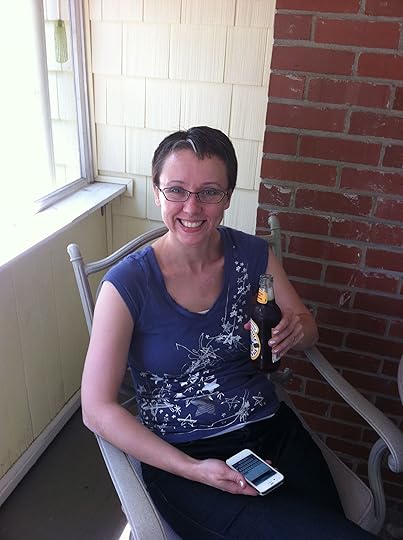 I picked up author Leah Petersen from Logan airport earlier in the day, and after a lunch of gyros and a pint or two, we braved Boston rush hour traffic and made our way to the Burlington Marriott, the traditional locale for ReaderCON.
I picked up author Leah Petersen from Logan airport earlier in the day, and after a lunch of gyros and a pint or two, we braved Boston rush hour traffic and made our way to the Burlington Marriott, the traditional locale for ReaderCON.
After a dinner filled with conversations about our WIPs, other cons and life in general, we made our way to the first reading of the evening. On the way, we chatted with Glenn Skinner (Fellow Booktroupian), Yves Meynard,
Eric Van, and a few other familiar faces. After an entertaining visit by the fire department, we ran into Peter Dubé – The host of the author reading we would be attending first.
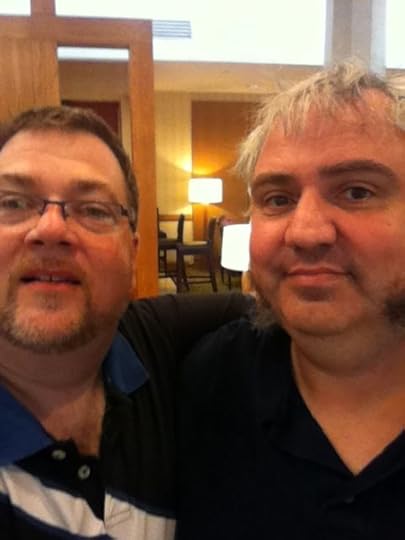
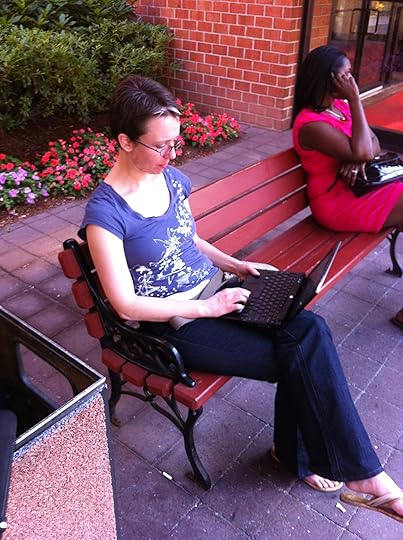
8:00 PM Thursday, 12 July
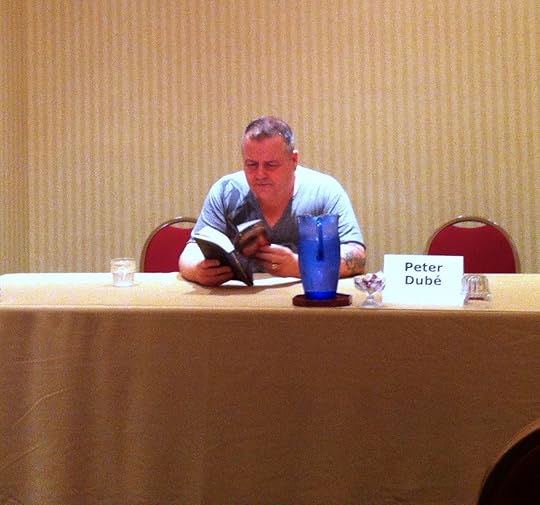
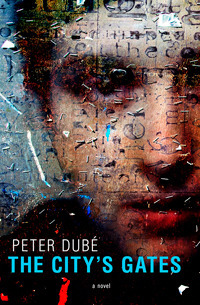 Peter Dubé read from the novel The City’s Gates.- Peter is a dynamic reader who drew us into his latest novel about a mystery surrounding strange events happening in the city of Montreal prior to a major economic summit. Told from the point of view of one of the investigators via a series of diary entries and official reports. Brilliant stuff and I must remember to pick up a copy when the bookshop opens on Friday.
Peter Dubé read from the novel The City’s Gates.- Peter is a dynamic reader who drew us into his latest novel about a mystery surrounding strange events happening in the city of Montreal prior to a major economic summit. Told from the point of view of one of the investigators via a series of diary entries and official reports. Brilliant stuff and I must remember to pick up a copy when the bookshop opens on Friday.
8:30 PM
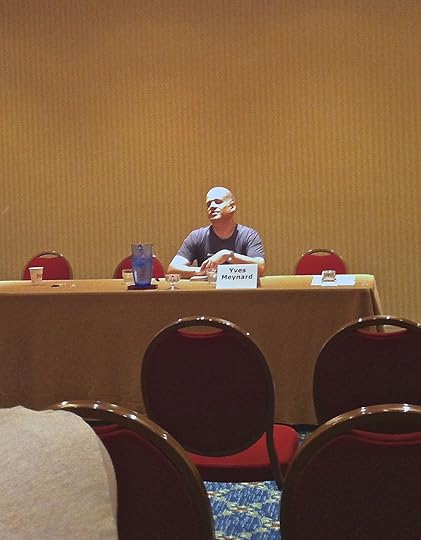
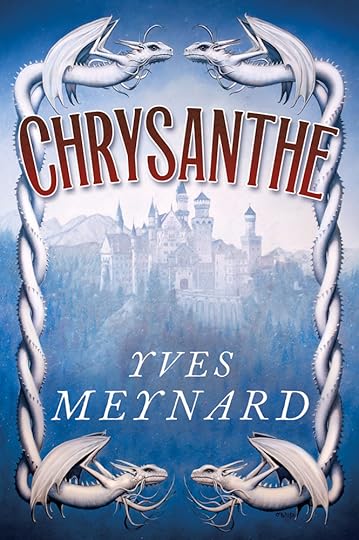 Yves Meynard read from his new fantasy novel, Chrysanthe. – Yves was soft spoken, yet as passionate as Peter had been. He chose a scene from the beginning of his latest, Chysanthe, that showcased his fantastical writing style. Might pick this one up too.
Yves Meynard read from his new fantasy novel, Chrysanthe. – Yves was soft spoken, yet as passionate as Peter had been. He chose a scene from the beginning of his latest, Chysanthe, that showcased his fantastical writing style. Might pick this one up too.
9:00 PM
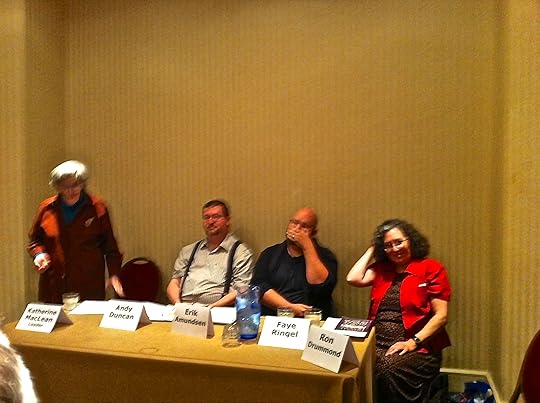 How Fantastic Is Fantasy? – A panel with Erik Amundsen, Ron Drummond, Andy Duncan, Katherine MacLean (leader), Faye Ringel. Leah and I entered the packed panel. Obviously this one was going to be popular and anticipation was high. Here is the description from the ReaderCON guide:
How Fantastic Is Fantasy? – A panel with Erik Amundsen, Ron Drummond, Andy Duncan, Katherine MacLean (leader), Faye Ringel. Leah and I entered the packed panel. Obviously this one was going to be popular and anticipation was high. Here is the description from the ReaderCON guide:
Audience members discuss events of supernatural import that we ordinarily keep locked in the closet: luck, coincidences, things that go bump in the night, telepathy and precognition, visions and dreams. Many people have had Experiences, but no one wants to look like a nut. In this discussion, we’ll let loose and explore our personal experiences of the places where reality gets weird.
I have to be honest; this panel wasn’t what I was expecting. I thought it would be more of a relating of paranormal experience to fantasy writing. In reality (ironic use of the word here), it was an audience participation sharing of strange experiences with the panel – and let me tell you some of the stories related were ‘out there.’ From a tale of seeing a large spider crawling up a young woman’s body three months before the actual incident, to UFOs and a dream that ending in a participant saying “I turned into something with blue talons and fought off some sort of demon,” this panel was…interesting. Well, I got some writing material anyway.
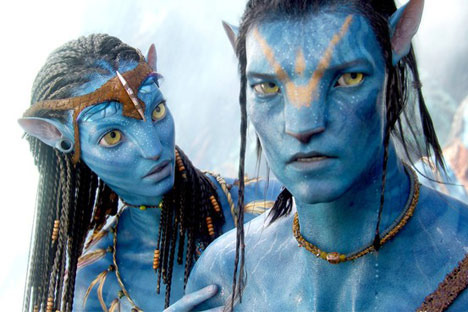
"Would you use your blue talons to save me?"
"No."



